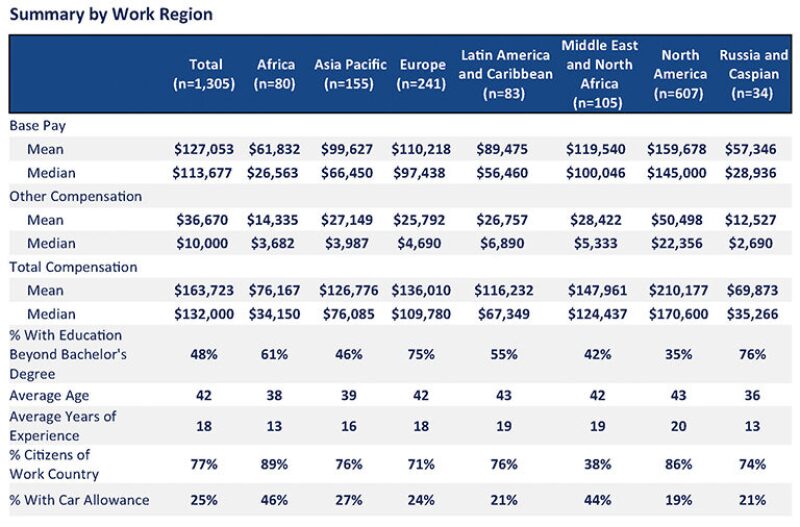In 2020, several changes were made to increase the usability of the annual SPE Membership Salary Survey. The Society of Petroleum Engineers (SPE) invited a random sample of 30,689 professional members to participate in the annual SPE Membership Salary Survey on 8 July 2020. This year, members were offered the choice of receiving a copy of the new SPE Salary Survey Executive Summary Report or the 2019 top 10 SPE papers in OnePetro®. The survey closed on 3 August with 1,724 complete and 231 partial responses, yielding a 6.4% survey response rate.
Valid compensation data for full-time employees were provided by 1,305 members, providing a 4.3% response rate and a margin of error of ±2.65% at a 95% confidence level.
SPE Super Regions were used this year to analyze regional trends. These Super Regions are the same ones used to annually report SPE’s membership demographics.
This year engineers were asked what job title most closely aligned with their job, overall years of work experience, and oil and gas experience. The 2020 SPE Salary Survey Executive Summary Report and 2020 SPE Salary Survey Full Report offer new analyses of compensation by engineering title and overall work experience.
Respondents were asked to provide their employment status, using the status that described them for the majority of 30 June 2019 to 30 June 2020. Almost all (95%) respondents indicated they are full-time employees. When asked to elaborate on their position, 85% of respondents reported as company employees. A small percentage of respondents (3%) are contract, freelance, or self-employed. The contract, freelance, or self-employed segment has fallen for the first time in the past 6 years. This year, 4% of respondents self-reported their position as consultants.
Participants in the 2020 SPE Membership Salary Survey represented 76 countries and 26 states in the United States. Most (62%) respondents are based outside of the United States. More than three quarters (77%) are citizens of the countries in which they work. Their employers’ headquarters are based in 73 countries. The percentage of female participants included in the report is like previous years at 15% (13% in 2019 and 2018).
More than one quarter (26%) of respondents work for an independent oil and gas company. Nearly one-third (30%) are employed by a service or manufacturing company. Almost one fifth (18%) are employed by an integrated oil and gas company, and less than one tenth (9%) work for a national oil and gas company. This year, 6% of members reported working for a consulting company.

General Findings
All compensation data presented in this highlight report is in US dollars (USD). Data were collected in local currencies and converted to USD using the exchange rate as of 3 August 2020, which is the effective date of this year’s data.
SPE professional members reported average total compensation (including salary plus bonus) of $163,723 in 2020, a decline from $197,027 in 2019. This is the lowest compensation recorded since at least 2014. Total compensation has decreased by 14% or more across the board this year for the five job levels tracked.
The mean base pay reported in 2020 ($127,053) is the lowest in recent years. Other compensation (including bonuses) decreased in 2020 ($36,670) for the first time in the past 5 years, interrupting a 4-year trend of increases in other compensation. Reservoir engineers reported earning the highest base pay ($158,857), followed by production engineers ($147,439).
In 2020, professionals receiving a car allowance stayed consistent with previous years at 25% (24% in 2019; 23% in 2018).
The average age of professionals in the survey is 42 years old, which remained the same as the prior 8 years. However, this demographic varied by gender. Males’ age is above the average at 43, and females’ age is below the average at 37.
SPE members have 18 years of overall work experience on average and an average of 17 years of experience in the oil and gas industry. There is a sizeable gap in experience between men and women. The average years of work experience was 19 years for males and 13 years for females.
The number of professionals who reported an education level higher than a bachelor’s degree is 48%, continuing a steady upward trend seen since 2016.
How To Learn More
SPE produces this annual salary survey to provide a reference for compensation in the oil and gas industry. The report is based on a sample of self-reported information from petroleum industry professionals.
This report provides a sample of the findings from the 2020 SPE Membership Salary Survey. The 2020 SPE Salary Survey Executive Summary Report and 2020 SPE Salary Survey Full Report provides a more detailed analysis of global oil and gas compensation, particularly for the various type of engineers in the sector. Explore the additional reports and survey data available at www.spe.org/industry/oil-and-gas-salary-survey.
Inquiries regarding the survey and suggestions for questions for next year’s survey may be addressed to speresearch@spe.org.

